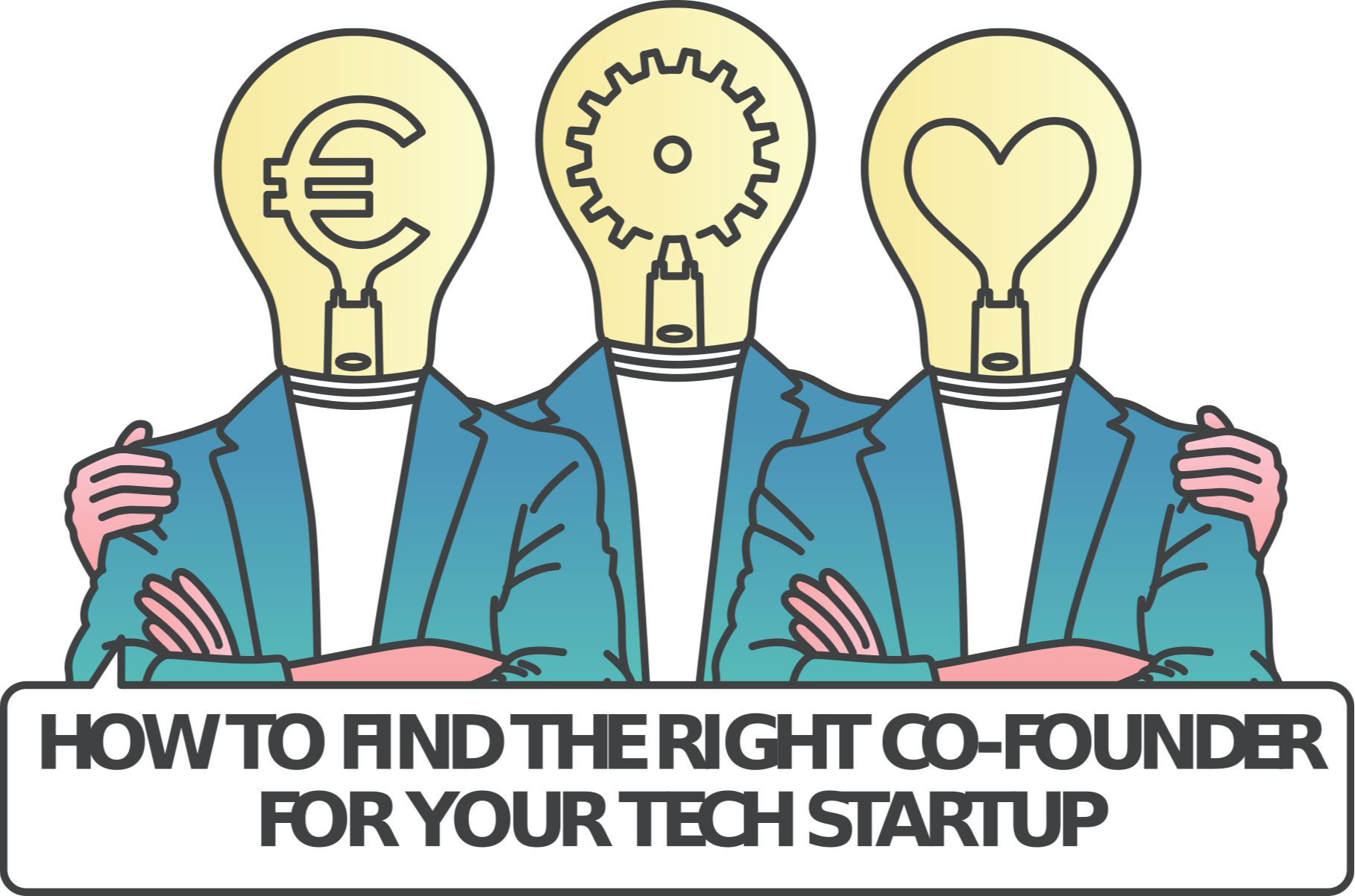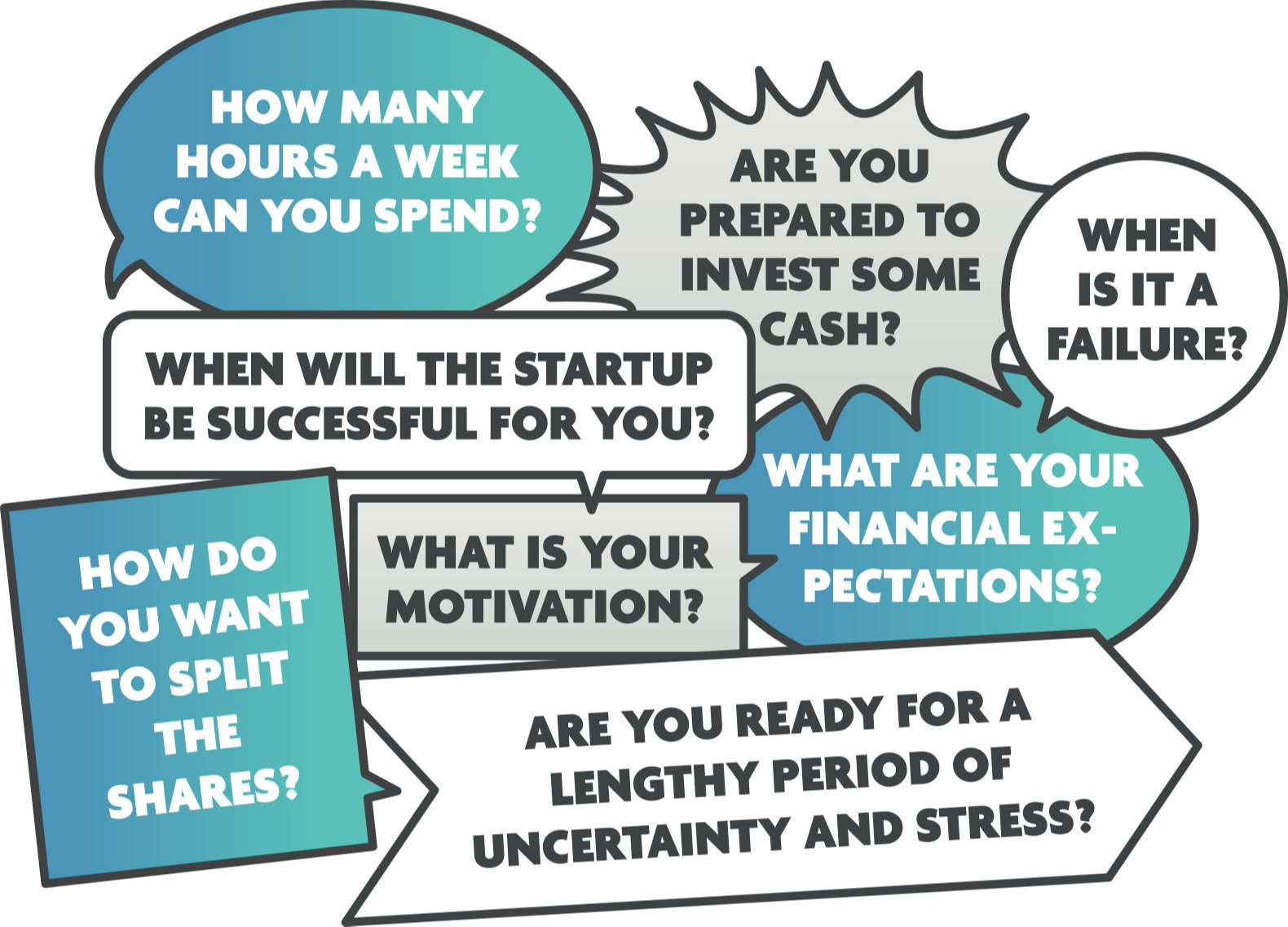How to find the right co-founder for your tech startup
Your relationship with your co-founder can make or break your startup. According to CB insights 23% of all startups fail because of a weak founding team. Finding the right co-founder might just be the biggest challenge you will encounter as a startup founder. So, how do you increase your chances of a match made in heaven?

We have been running our business accelerator imec.istart for more than 10 years. We have witnessed many startups struggle with co-founder issues. And unfortunately, we have seen many teams split up, after putting in a lot of hard work. It’s a damn shame every time talented entrepreneurs hit the wall because they didn’t manage to make their founding team work.
Why do you need a co-founder?
First things first: do you really need a co-founder? Didn’t Elon Musk become the richest person on the planet all by himself? Why wouldn’t a one (wo)man army get the job done?
Well, you can try it on your own, but it will be much harder. Two people know more than one, that’s simple mathematics. There’s also the shared burden. Building a startup is hard work, you will discover new problems and challenges every day, you will encounter setbacks every day. Pain shared is pain lessened.
That is why investors are rarely willing to invest in single founder companies. That is also why we at imec.istart don't admit single founder startups to our program. Ten years of experience show us that startups with two or more founders have a much higher success rate.
How to find a co-founder?
Ok, you are ready to join forces with a co-founder. How (and where) do you find the perfect partner in crime?
- Talk with as many people as possible. Make sure everyone you know is aware of who exactly you are looking for. The more people know you are looking for a co-founder, the more likely it is that you get introduced to the right person.
- Attend networking events and get to know new people. These events are usually organized by professional associations, communities, Meetup, chambers of commerce, incubators and accelerators. They attract an interesting crowd. Try to connect especially with well-connected people like investors, program directors and community managers. imec.istart also organizes a Startup Matchmaking event twice a year. Founders looking for co-founders and other team members can meet people eager to join a startup.
- Use social media to make a call for a co-founder. Use your LinkedIn profile to connect with potential co-founders or at least matchmakers you can point you in the right direction. Be active in Facebook groups like BeTech & Startup Zoekt Co-Founder in Belgium. For the ones with an international focus; there is an active co-founder thread on Reddit.
- You can also publish and promote a vacancy on social media or Angellist, where you describe the co-founder profile you are looking for. Don’t be too specific or too demanding yet, in this stage you are looking for interesting leads and inspiring conversations.
How do you know your co-founder is fit for the challenge?
So, you have found your potential co-founder. How do you screen the candidate? We asked ex Venture Acceleration Manager imec.istart Luc Jacobs what to do next.
“A successful startup requires at least two complementary co-founders. One that can program in Python and the other in Java, that’s not being complementary :) You need a mix of technical and commercial skills. You need to develop an innovative product, but you also need to be able to bring the product to the market. People tend to have a network of people who share similar skills and passions. That doesn't make it easier to find the right person to start a business with.”
“When founders have finally found potential candidates, they are re so eager to get them on board that often avoid the tough questions. Time is money and speed trumps perfection, but you can’t compromise on your co-founders. You need to raise the bar and you need to tackle the tough questions.”

8 questions you must ask your co-founder
The most common issue among co-founders is a mismatch of expectations. We have listed 8 questions every founder must ask potential co-founders in order to align expectations.
1. When will the startup be successful for you?
Do you want to build a large company? Do you want to launch a product and sell the business in the coming years? How much do you want your shares to be worth? You need to agree on your ‘north star’: if you don’t know where your startup is heading to, it will be near impossible to stay on course. When you and your co-founder define success in a totally different way, how will you ever know when you will reach your goal?
2. When will the startup be a failure?
As long as you don’t go bankrupt, you can keep your startup running. But ‘keep on going, no matter what’ is probably not the ambition you have set at the start. When should you pull the plug on the startup? How long do you want to keep on trying before concluding it's best to throw in the towel?
3. What are your financial expectations?
In the beginning, most startup founders don’t earn a penny. It always takes longer than expected before you can start cashing in. When investors jump on board, don’t expect a generous salary. Your shares increase in value, for the investors that is enough of a reward already. Are you ok with working long and tiring hours for little money? Is your family ok with that? For how long do you plan to keep up with the lack of money?
4. How do you want to split the shares?
Suppose you find a co-founder and he/she suggests splitting the shares 50/50. Do you think that is fair, given you came up with the idea for the product or the service that you are selling? Most startup founders don’t split the shares in half. Not everyone brings the same experience or value to the table, not everyone will be prepared to make the same sacrifices. Potential investors are reluctant towards an equal split, it makes them believe that you took the easy way out because you didn’t have the guts to tackle the hardest of all issues.
We recommend reading “The Founder’s Dilemmas” by Noam Wasserman. There is also an online tool called GUST that helps you split the shares in your startup. The free tool helps you ask the right questions to determine how much value each founder contributes. It gives you an objective recommendation for a fair equity split. Be aware that this type of discussion between founders is the stuff that can kill founder teams. But it’s not a discussion you can avoid, so, make sure you don’t postpone it.
5. Are you prepared to invest some cash?
A founder who just finishes school will probably not be able to invest money in a startup. But if your potential co-founder has been earning money for a few years already and is not prepared to invest 5 or 10K, that does not show a lot of commitment or trust.
6. How many hours a week can you spend?
Ideally, a startup is a fulltime commitment, or even a 150% commitment. But that is not always possible for every founder. That does not need to be a huge problem, if everyone is clear about it upfront. Put on paper (in a signed management agreeement) how much time you will commit to the startup, for how long and for how much money. If your co-founder can’t commit full-time from the start, make sure you agree to a milestone somewhere along the way. ‘When we make X euros or when we have Y customers, I will quit my job and go all the way for the startup.’
7. What is your motivation?
Are you particularly motivated by the original idea and the original approach? Are you flexible enough to pivot to whatever is needed, from changing the product to changing the market, go from B2B to B2C, from PHP to Python, from direct sales to SaaS, from your home market to another region? Are you prepared to do whatever it takes to make the business successful?
8. Are you ready for a lengthy period of uncertainty and stress?
You don’t need to take our word for it, but startup life can be pretty tough. Everything will take you longer than expected. You will make less money than expected. You may even face an empty bank account. You will have to fail and try again, fail and try again, fail and... You get the picture. Before starting a business together, you need to check how your co-founder deals with stress and failure.
Hire slow, fire fast
When you have both answered all the questions, you have an indication of the common ground between your co-founder and yourself. If you are on the same page on most issues, you can skip most questions and you can focus on overcoming the few remaining differences.
If those differences are numerous, critical and irreconcilable, there is no need to push even further. Say goodbye to each other and try to find another co-founder. Hire slow, fire fast. That also goes for a co-founder.

Boost startup success with developing team dynamics
At imec.istart we have witnessed more than 250 startups trying to launch and scale their business. Because co-founder and team issues have proven to be a real gamechanger, we have clinical psychologist Karlijn Koek as a full-time Team Dynamics & Leadership Officer. She helps the startups in our acceleration program to create, strengthen and reinforce successful team dynamics. She sets up customized workshops and coaching sessions on topics like leadership, conflict management, personal growth, mental health and communication.
Matchmaking event
Finding a co-founder when you want to launch a startup can be a daunting task. That is why imec.istart organizes Startup Matchmaking events twice a year. Founders looking for co-founders and other team members can meet people eager to join a startup.


